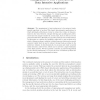Free Online Productivity Tools
i2Speak
i2Symbol
i2OCR
iTex2Img
iWeb2Print
iWeb2Shot
i2Type
iPdf2Split
iPdf2Merge
i2Bopomofo
i2Arabic
i2Style
i2Image
i2PDF
iLatex2Rtf
Sci2ools
153
Voted
SEBD
2003
2003
Management of User Preferences in Data Intensive Applications
Abstract. The management of user preferences is becoming a fundamental ingredient of modern Web-based data-intensive applications, in which information filtering is crucial to reduce the volume of data presented to the user. However, though deriving and modeling user preferences has been largely studied in recent years, there is still a need for practical methods to efficiently incorporate preferences in actual systems. In this paper we consider the qualitative approach to user preferences in which a binary preference relation is defined among objects and a special operator (called Best) is used to extract relevant data according to the preference relation. In this framework, we propose and study a special index structure, called β-tree, which can be used for a rapid evaluation of the Best operator. We then present a number of practical algorithms for the efficient maintenance of β-trees in front of database updates and discuss some relevant implementation issues.
Preference Relation | SEBD 2003 | SEBD 2007 | User Preferences | Web-based Data-intensive Applications |
| Added | 01 Nov 2010 |
| Updated | 01 Nov 2010 |
| Type | Conference |
| Year | 2003 |
| Where | SEBD |
| Authors | Riccardo Torlone, Paolo Ciaccia |
Comments (0)

